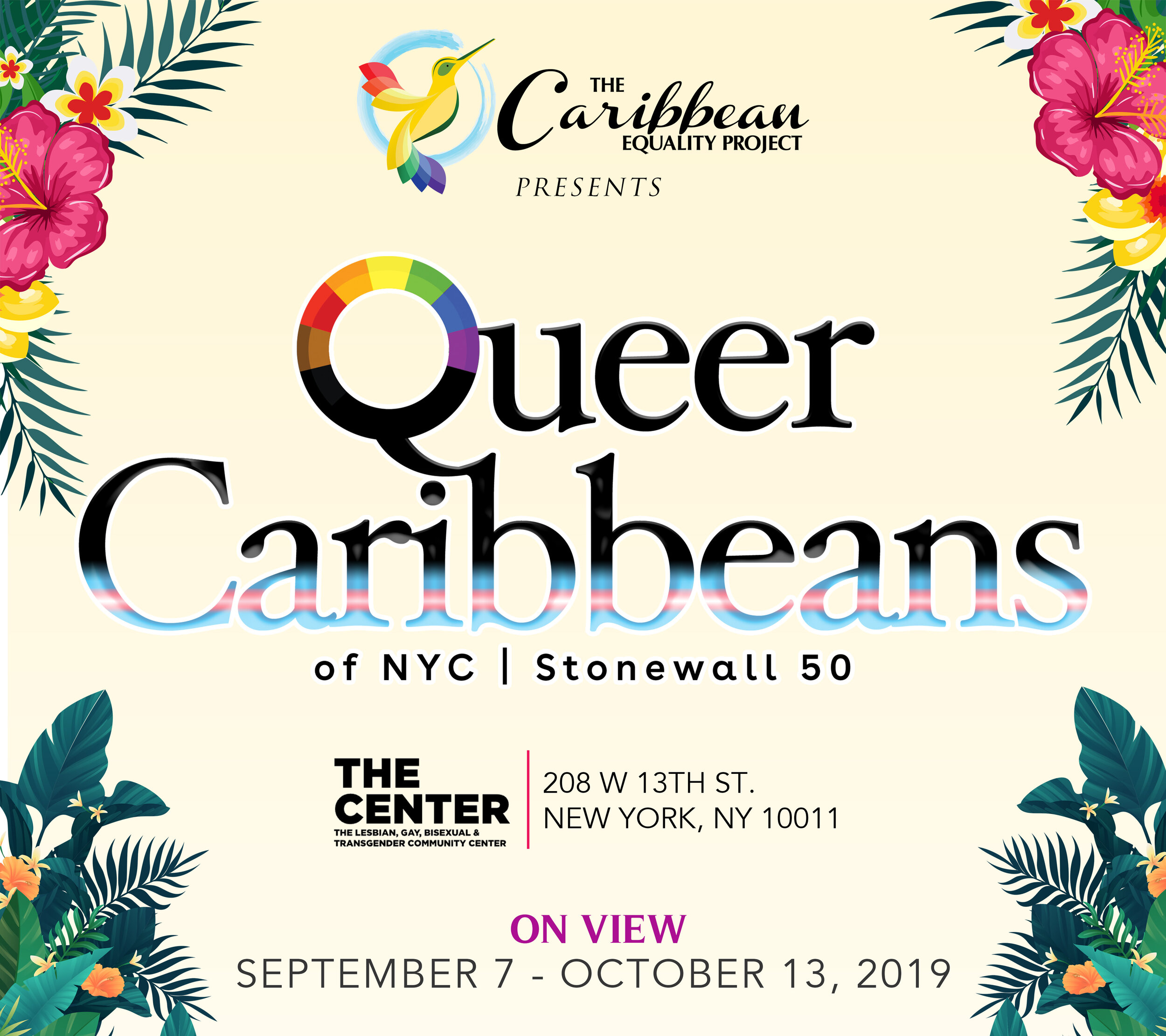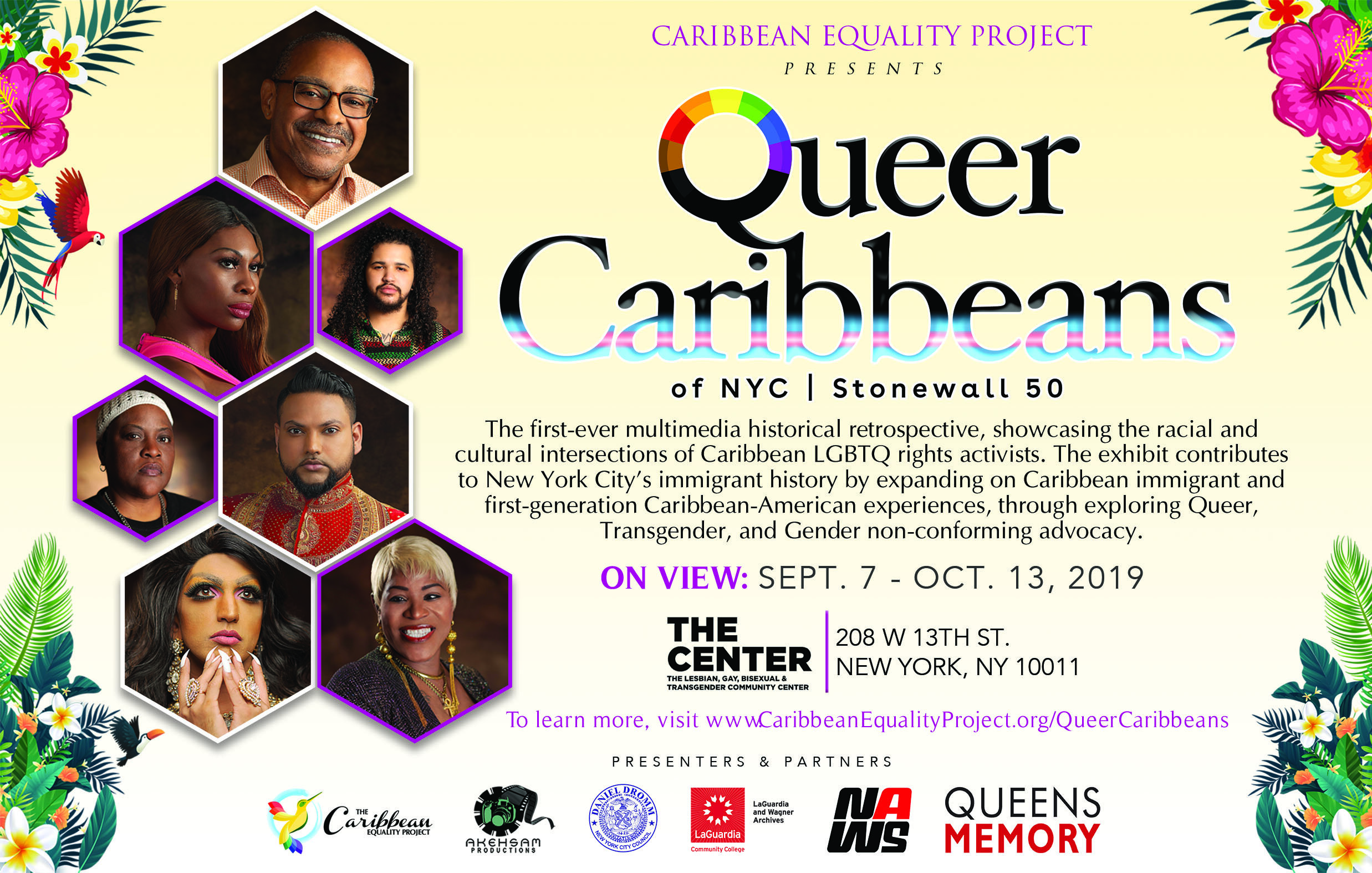Queer Caribbeans of nyc | Stonewall 50 EXHIBITION
Date: On View Sept. 7 – Oct. 13, 2019
Venue: The Lesbian, Gay, Bisexual & Transgender Community Center, New York City (208 W 13 Street, New York, NY 10011)
Organization: Caribbean Equality Project (CEP)
To commemorate the 50th anniversary of the Stonewall uprising, the Caribbean Equality Project presents “Queer Caribbeans of NYC | Stonewall 50," the first-ever multimedia historical retrospective showcase of the racial and cultural intersections of Caribbean LGBTQ rights activists. The exhibit contributes to New York City’s immigrant history by expanding on Caribbean immigrant and first-generation Caribbean-American experiences, through exploring Queer, Transgender, and Gender non-conforming advocacy.
This multimedia retrospective showcases the pioneering work of Caribbean activists, organizers, and artists who set the foundation for victories within the Caribbean LGBTQ+ diasporic community, and their contributions to the broader LGBTQ+ liberation movements of New York City, including Caribbean Pride, Sistas of Caribbean Ancestry (SOCA), Curry Club NYC, Chutney Pride, Urban N' Out, the Gay Caribbean USA Pageant, and Caribbean Equality Project.
The "Queer Caribbeans of NYC" exhibition documents 30 years of racial and cultural intersection of Caribbean LGBTQ rights activists with an extensive repository of never-before-seen photographs, news footage, posters, oral histories, and videos featuring interviews with well-respected Caribbean LGBTQ rights advocates. This includes the Tobagonian star of “Pose”, Dominique Jackson; Trinidad-born activist Colin Robinson, co-founder of “Big Truck,” Carnival Movement -which is a tradition of Caribbean LGBTQ visibility and representation at the NYC Pride Marches- created in the late 90’s; Bajan trans activist and co-founder of CK Life, Kim Watson; founder of Chutney Pride, Tina Arniotis, and the founder and Executive Director of Caribbean Equality Project, Mohamed Q. Amin.
To learn more about all the featured participants, click here.
A multimedia timeline from the early 1990’s -to the present- anchors the exhibit, taking viewers through the struggles against fear and invisibility spurred by colonialism, the migrant “coming out” experience, and to the contemporary legal victories in Belize, Trinidad & Tobago and Guyana (where four trans women won a lawsuit contesting Guyana’s “cross-dressing” laws). The timeline concludes with a look into the future of LGBTQ+ rights in the Caribbean diaspora, through the lens of Trinidadian photographer and filmmaker Masheka Joseph’s original portraits of over twenty notable LGBTQ activists, artists and academics of Caribbean heritage and/or descent.
This pioneering exhibition opened on September 7, 2019, at the iconic Lesbian, Gay, Bisexual & Transgender Community Center in New York City and is on view until October 13, 2019. The exhibition will then rotate periodically throughout New York City to other venues. In the next two years, the “Queer Caribbeans of NYC” archive will also be available online, and artifacts from the first edition of the exhibit will be compiled in a companion hardcover coffee table book. The Opening Reception of this ongoing historical project coincided with the 2019 New York Caribbean Carnival week and the 52nd Annual West Indian Day Parade in New York City.
The primary goals of the Queer Caribbeans of NYC exhibition:
· Contribute to New York City immigrant history by expanding on Caribbean immigrant and first-generation experiences as told through the eyes of LGBTQ artists, performers, activists, academics, leaders, elders, and other community members of the diaspora.
· Create a physical and virtual archive that is free and publicly available as an academic, journalistic, historical, and cultural resource.
· Serve as a public education program on Caribbean LGBTQ history by lending our archives to educational institutions and museums.
· Continuous expansion of the archive to include more LGBTQ people across the Caribbean diaspora, with a focus to add more voices to Queer & TGNC community.
Advocates across the Caribbean diaspora continue to galvanize the LGBTQ+ community against those who tell them that their existence contradicts the laws and cultural values of their home countries. But in 2018 and 2019, an unprecedented shift in policies affecting LGBTQ+ people of Caribbean & Central American heritage arrived: Colonial-era anti-LGBTQ+ laws criminalizing same-sex intimacy and transgender visibility were successfully challenged in Belize, Trinidad & Tobago, and most recently in Guyana, where four transwomen won a lawsuit contesting Guyana’s “cross-dressing” laws. And despite the existence of similar anti-LGBTQ+ laws in Jamaica & Barbados, LGBTQ+ communities held the first-ever Pride celebrations in their respective nations.
With Dominicans, Jamaicans, Guyanese, Haitians, and Trinidadians comprising five of the ten largest immigrant groups in New York City, people of Caribbean heritage - who make up almost thirty percent of the city’s 3.3 million immigrant population - have made prominent contributions to New York City’s food, music, business, political and cultural scenes since the first Jamaican immigrants arrived in the late 1800s.
Less prominent were the Afro and Indo-Caribbean LGBTQ+ migrants whose identities and stories remained hidden from their conservative migrant communities. The founding of Caribbean Pride by Trinidad-born activist Colin Robinson in the late ’90s and Curry Club NYC and Sholay Productions – two of the first known Caribbean and South Asian LGBTQ social spaces - in the early 2000s provided that small taste of their island and native homelands, while allowing opportunities for queer & TGNC immigrants and first-generation Caribbean-Americans to dance, network, celebrate cultural diversity and organize around social justice issues; Giving rise to a generation of activists whose quiet, but significant contributions to the LGBTQ rights movement brought us Caribbean-oriented Pride events, rainbow flags staking their claim at widely celebrated religious and cultural holidays and groundbreaking legislation spanning over 20 years.
Organization Overview
The Caribbean Equality Project (CEP) is a Queens, New York-based organization that empowers and strengthens marginalized voices of lesbian, gay, bisexual, transgender, and queer people of Caribbean origin and descent through advocacy, community organizing, education, and cultural and social programming. Established in 2015, to date, CEP is the only educational-based agency serving the Caribbean-American LGBTQ+ community in New York City by cultivating a supportive and progressive Caribbean community free of violence, oppression, and discrimination. CEP’s advocacy efforts are directed toward fostering community partnerships and greater family acceptance. As an immigrant-led, intergenerational social justice and human rights organization with a focus on intersectionality, CEP educates, inspires, and empowers LGBTQ+ people in NYC of all ages, ethnic & religious identities across the Caribbean diaspora. Additionally, the organization acts as a liaison to government agencies and elected officials with the collective vision of an equitable society based on justice, inclusion, and equality, regardless of an individual's sexual orientation or gender identity within the Caribbean diaspora.
As all of us at Caribbean Equality Project celebrate and express gratitude to the brave individuals who have made it all possible; activists, drag queens, lawyers, academics, and various others; The continued archive curation of Queer Caribbeans in the diaspora ensures they forever will be commemorated.
Curated by Mohamed Q. Amin and Assistant Kadeem Robinson of the Caribbean Equality Project, this exhibition is made possible through the generous support of The Lesbian, Gay, Bisexual & Transgender Community Center of New York City, the LaGuardia and Wagner Archives at LaGuardia Community College/CUNY, the New York City Council, through the office of Daniel Dromm, the Queens Memory at Queens Public Library, and NAWS Central Queens.
















